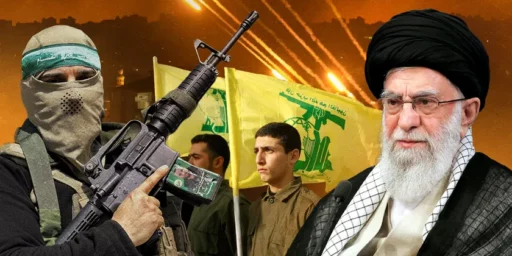Is the UN Good for Anything?
I’ve often commented that the United Nations deserves its bad rap for futility in collective security matters but that it is actually quite effective in its humanitarian endeavors, including pure peacekeeping missions (as opposed to peace enforcement missions that require active combat). Mark Leon Goldberg, responding to a bit of snark from the good folks at RedState, bolsters that view.
Consider this: since 1988, when the UN-sponsored Global Polio Eradication Initiative began, cases of polio have plummeted worldwide from 350,000 in 1988, to 1,263 in 2004. This success comes on the heels of the global eradication of smallpox by the World Health Organization almost 20 years earlier. And in addition to ridding the world of these scourges, UN agencies have combated obstetric fistula, and helped to contain outbreaks of deadly diseases like yellow fever and plague.
The United Nations is also on the front lines in the fight against the most terrifying global health scenario: an outbreak of bird-flu. United Nations agencies are working in east asian countries to help detect and contain the virus from spreading across borders and across shores.
It gets a bit dicier, however, when Goldberg tries to defend the UN’s record of accomplishment in matters of security.
In areas of peace and security, the UN has a long list of accomplishments. Let’s start with the most recent. Hezbollah and Israel are no longer fighting each other in Southern Lebanon. Why? Because Kofi Annan shuttled around the region following Security Council resolution 1701 and shored up the peace. He secured peacekeepers from Europe and Israel-friendly Muslim countries (as Israel demanded) and negotiated the lifting the sea and air blockade (as the Lebanese demanded). Now, refugees have returned home in southern Lebanon and Northern Israel.
Annan’s efforts in this regard were greatly aided by the fact that the fighting had come to a stalemate, with the Israelis realizing they were losing and Hezbollah realizing that they had achieved all they could. We’ll see, moreover, how long the peace lasts. Once Hezbollah has rebuilt its weapons cache, it may well seek to exploit the next available opportunity.
Other less visible peacekeeping missions are also paying dividends for American interests worldwide. If UN peacekeepers were not in Haiti right now, US marines would have to be. If UN peacekeepers were not in Liberia, Marines and the British Army would be there. And if Peacekeepers were not in East Timor, the Australian military would have to deploy large numbers of troops there. It is no wonder why both the Quadrennial Defense Review and National Security Strategy for 2006 would emphasize the importance of UN peacekeeping for American national security. These are the three biggest contributors to the coalition in Iraq.
Morever, even were it not for the war in Iraq, the American public simply has no interest in sending large contingents of soldiers to such nations for peacekeeping duty. The UN is perfect for the job.
And on that same topic, something that Redstate would likely agree was a highlight of the Iraq war, the “purple finger moment,” was accomplished using UN workers with experience in running elections in conflict zones. Similarly, the UN helped to administer elections in Afghanistan in 2005.
Quite so although, again, the UN’s ability to do what I does well was contingent on other militaries–notably that of the US and UK–having laid the framework by force of arms. More than a dozen UN Security Council resolutions had been ignored up to that point.





The US is largely incompetent for the same reason the UN is…too many disparate interests. And if you want to criticize the UN for certain actions why don’t you make sure that the US wasn’t the one who put the kibosh on the proposal.
I have no doubt that some of the functions of the UN are desireable and executed well. That’s beside the point. Why is an umbrella group like the UN a better way of approaching those problems than ad hoc cooperative organizations of countries set up for the purpose?
Said another way I can see why the the UN needs the WHO. I can’t see why the WHO needs the UN.
I think the UN is mostly a giant waste of taxpayer money, and most of what it does do well seems to come with corruption attached. Many on the left rightfully attack some of the GOP congress members who have been caught up in corruption, but you don’t hear too much about the various UN corruption scandals.
Also, while I think for the most part the UN is totally useless, and it does more to lend legitimacy to despots and tyrants it can do some things well, but I am not convinced the UN is the only agency that could do the things it does do well.
NOPE!
The UN is an absolutely inevitable, and hence necessary organization. Institutions of broad scope arise almost organically as a function of the interactions of entities on lower levels of organization. The interactions of nation-states, in this ever-advancing, ever-developing, highly interconnected world are so numerous, so interdependent, so capable of giving rise to resonances throughout the global system, that a forum in which issues and conflicts can be discussed cannot be avoided.
Along with so many other bizarre and irrational effects, the rise of modern conservatism in the US over the past few decades has engendered a dredging up of ancient arguments, from the days when the international system was in its infancy, that the UN is some sort of an alien force that must be opposed, that it somehow entraps the US into the messy and distasteful stew of alien politics, blunts the force of our noble and clearly defined mission in the world, and somehow serves to corrupt all of our precious bodily fluids.
The UN is a formal venue for inter-national communication. Any mature political perspective will focus on leading America towards a position of mastery of the game of global politics, rather than incessantly urging us to run off the stage.